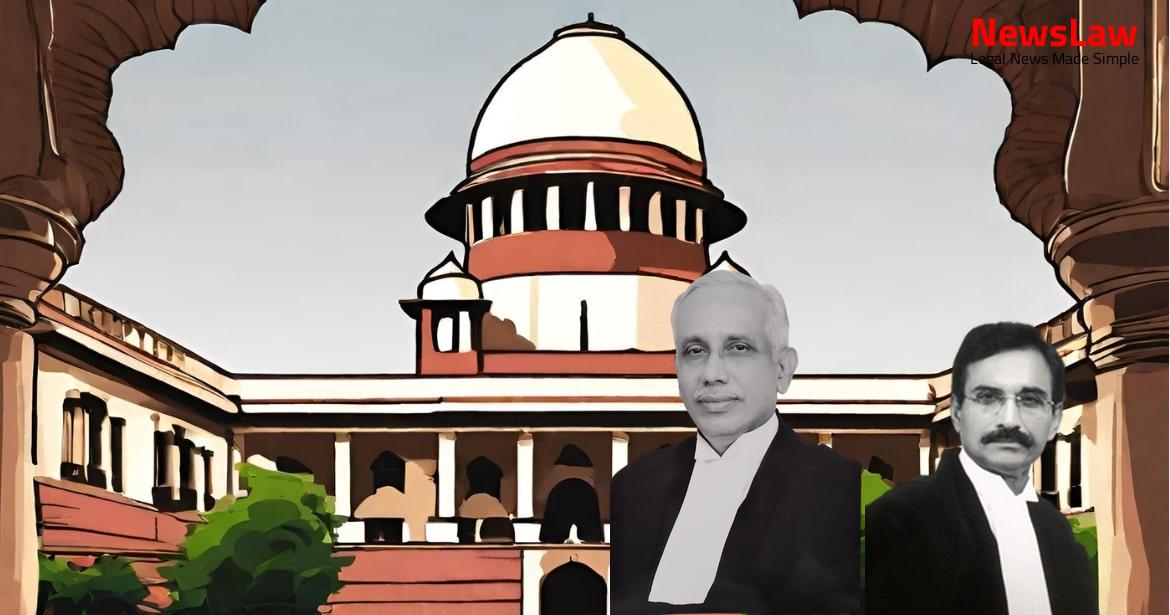The court’s scrutiny of the prosecution’s evidence in an NDPS Act case has unveiled critical issues surrounding witness credibility, contraband presentation, and legal compliance. Stay informed about the nuances of key legal procedures and their impact on the outcome of such cases in this engaging summary.
Facts
- Accused informed of the option to have search witnessed by Gazetted Officer or Magistrate
- Formal FIR registered
- Prosecution examined 8 witnesses
- Charge-sheet filed after FSL report and investigation completion
- Samples taken for testing
- Search carried out on appellant’s directions
- Appellant convicted under Section 18 of NDPS Act by Trial Court and High Court
- Bag suspected to contain narcotics
- Appellant denied incriminating circumstances during questioning under Section 313
- Prosecution case involved interception of appellant and another accused carrying bag of opium
Also Read: Analyzing Legal Reasoning in a Poisoning Death Case
Arguments
- The petitioner’s counsel presented several contentions to challenge the prosecution’s case.
- The presence of DSP Om Parkash at two different locations during the same time period cast doubt on the validity of the search conducted in the case.
- Reference was made to various court judgments to support the contention that key witnesses were not present during the search and examination.
- The absence of a large quantity of contraband produced before the court raised questions regarding the evidence presented.
- The applicability of Section 50 of the Act concerning personal searches was emphasized, highlighting a lapse in compliance in the present case.
- Contradictory views from previous court cases were compared and the necessity of following legal procedures was stressed upon.
- The lack of independent witnesses supporting the prosecution’s case was pointed out, indicating a potential weakness in the evidence presented.
- Supports the judgment of the High Court regarding the non-production of any independent witness.
- Contends that the law does not mandate the production of contraband articles in court.
- No dispute raised by Counsel regarding the non-production of contraband article in court.
- Contraband articles were recovered from within the bag carried by the accused.
- Search of a bag does not require compliance with Section 50 for searching the person of the accused.
- Discrepancy in timing should not be used to discredit the testimony of the witness.
- Mentions the presence of the FSL report as evidence.
- No provision in the Act mandates the production of the FSL report.
- Appellant did not raise the complaint regarding non-production of FSL report before Trial court or High Court.
Also Read: Analysis of Circumstantial Evidence in Criminal Case
Analysis
- The High Court’s view was deemed unsustainable by the Court.
- Prosecution failed to produce seized materials as material objects during the trial.
- Panchnama was deemed unreliable due to the panchas turning hostile.
- Heavy burden on prosecution to prove possession of contraband under NDPS Act.
- Non-production of contraband material before the court raised doubts.
- Witness testimony regarding contraband production lacked corroboration.
- No independent witnesses were present during the recovery of contraband.
- Seizure officer’s testimony was inconsistent about the time and place of seizure.
- Lack of production of contraband substance in trial court raised questions about conviction.
- Contraband material not being securely handled from seizure to forensic testing was noted.
- Samples for forensic examination were delayed in being deposited at the FSL.
- The deposit of contraband in the Malkhana lacked documentary corroboration.
- The argument of no independent witnesses was not raised during trial or at the High Court.
- The lack of production of contraband articles was highlighted as a procedural flaw.
- Contraband seizure and production before the Magistrate could not be proven convincingly.
- Contraband articles were found on search but doubts remained about the presence of the DSP at the spot.
- Appeal for change in the appellant’s incarceration location was left to her discretion.
- In cases where personal search of the accused is conducted, compliance with Section 50 is mandatory
- Non-compliance with Section 50 can lead to the benefit of doubt being extended in favor of the accused, as seen in various judgments like Ashok, Vijay Jain, and Vijay Pandey
- The personal search and recovery from a vehicle are treated as separate instances, and benefits cannot be extended on one ground to invalidate the other
- Recovery from the search of the vehicle is valid even if there was non-compliance with Section 50 in terms of personal search
- Seizure being proved on record, and the integrity of samples taken from contraband being intact are essential for prosecution
Also Read: Interplay of CrPC and Drugs Act: Legal Analysis
Case Title: THAN KUNWAR Vs. THE STATE OF HARYANA (2020 INSC 241)
Case Number: Crl.A. No.-002172-002172 / 2011



